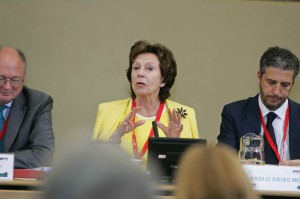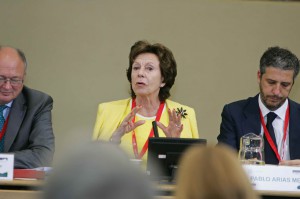Telefónica Public Policy & Telefónica España Regulatory teams
As announced last month on this blog, the 3rd Digital Agenda Assembly (DAA13) was hosted by the Irish Presidency on 19th and 20th June in Dublin. During the event, 650 delegates from the industry, civil society and European Institutions presented, reviewed and analyzed the progress and challenges of the Digital Agenda for Europe. In addition, almost 4,000 people followed the DAA13 via live webstream and more than 11,000 contributed actively through social media.
In the first day of the event Telefónica participated in Workshop 4: Broadband demand stimulation: the impact of cloud #da13cloudBB. The Workshop focused on how cloud computing changes the demand for broadband; the infrastructure requirements for cloud services; as well as the role of the public sector in broadband demand stimulation.
At this session, Tim Marsden, Telefónica Digital, explained how telecom providers can play a significant role as cloud service providers by leveraging their know how as infrastructure providers and their security capabilities. Operators also can provide unified offers that pack cloud services of different cloud providers. In addition, Gabriel Gauthier, Alcatel Lucent, pointed out that the network layer is local, while the service level can be pan EU or global. For the delivery of pan EU services she advocated for standardized IP access products.
European Commission Vice President Kroes participated in Workshop 7: The Digital Single Market for business and consumers #da13DSM. During this workshop she mentioned the importance of passing the recommendation on costing and non-discrimination to create incentives to investment for telecoms operators and noted that she is in favor of regulation only when necessary.
VP Kroes added at the Plenary Session: Driving European Growth Digitally that the European Commission (EC) will propose a new regulatory environment for broadband, offering consistency, certainty and competition. Kroes wants to remove barriers as today telecoms operators are stuck in national markets (referring to passport, access product for fixed and mobile). She wants to safeguard net neutrality on every device and on every network, and also repeated that the EC wants to bring roaming to an end for once and for all. Kroes urged the European Parliament and the Council of the European Union to give urgent priority to this legislation.
Also at this Session, the Irish Minister for Communications, Energy and Natural Resources, Pat Rabbitte TD, highlighted the progress of the Irish Presidency of the Council of the European Union during the first half of 2013. In particular, Rabbitte referred to the Irish Presidency’s progress on the following 5 important files:
- The Irish Presidency finalized the Directive on the Re-use of Public Sector Information. This is a Directive which will make public sector information available to citizens and entrepreneurs allowing new digital products and services to emerge.
- The Irish Presidency concluded a new mandate for ENISA, while simultaneously progressing the proposed Directive on Network Information Security and a new Cyber Security Strategy for Europe.
- The Irish Presidency gave particular priority to the eIdentification and Trust Services file, which are essential measures for an effective digital Single Market.
- The Irish Presidency made good progress on Data Protection and copyright, which are key issues for a digital single market, in the Justice and Home Affairs and Competitiveness Councils.
- The Irish Presidency has commissioned some important research by Ireland’s National Disability Authority on the Web Accessibility Directive, which is a key theme of the Digital Agenda for Europe. The research will assess what Member States might need to do to ensure that citizens are not excluded from access to online Government services.
Rabbitte finalized his speech reminding that the digital economy and competitiveness will be the central item on the agenda of the European Council meeting this coming October: “As we know the pace of growth of the digital economy far outpaces that of other sectors. At a time when so many areas of the economy in Europe are more or less stagnating, digital is a shining star. I’m sure the debate today will help shape the preparations for the digital European Council.”
Overall, the Digital Assembly was an opportunity to take stock of the progress made to reach the Digital Agenda objectives and also to discuss the ongoing and future challenges. Telefónica is committed to help Europe to achieve the Digital Agenda objectives and will continue to collaborate with the European Institutions to create an appropriate framework for investment and growth.











